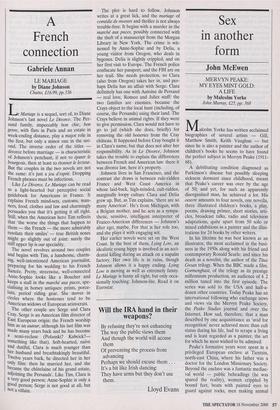A French connection
Gabriele Annan
LE MARIAGE by Diane Johnson Chatto, £16.99, pp.336 Le Mariage is a sequel, sort of, to Diane Johnson's last novel Le Divorce. The Per- sand family, impeccably bon chic, bon genre, with flats in Paris and an estate in week-ending distance, play a major role in the first, but only a minor one in the sec- ond. The inverse order of the titles divorce before marriage — is characteristic of Johnson's penchant, if not to epater le bourgeois, then at least to etonner le lecteur. But the couples in the two novels are not the same: it's just a jeu d'esprit. Dropping French phrases must be infectious. Like Le Divorce, Le Mariage can be read as a light-hearted but perceptive social guidebook for Americans in France. It explains French mind-sets, customs, man- ners, food, clothes and law and charmingly persuades you that it's getting it all right. Still, when the American hero Tim reflects that 'the worse the things that happen to them — the French — the more admirably resolute their smiles' — true British noses might go slightly out of joint: surely the stiff upper lip is our speciality. The novel revolves around two couples and begins with Tim, a handsome, charm- ing, well-intentioned American journalist, Preparing for his wedding to his French fiancée. Pretty, streetwise, well-connected Anne-Sophie looks like a Boucher and keeps a stall in the marche aux puces, spe- cialising in horsey antiques: prints, porce- lain, period riding gear. She moves in circles where the hostesses tend to be American widows of European aristocrats. The other couple are Serge and Clara Cray. Serge is an American film director of East European origin: the French worship him as an auteur, although his last film was made many years back and he has become a semi-recluse (Polanski? Kubrick?— something like that). Soft-hearted, naive and dutiful, Clara is much younger than her husband and breathtakingly beautiful. Twelve years back, he directed her in her only film: then he married her, and she became the chatelaine of his grand estate, adjoining the Persands'. Like Tim, Clara is a Very good person; Anne-Sophie is only a good person; Serge is not good at all, but not a villain. The plot is hard to follow. Johnson writes at a great lick, and the manage of comedie de moeurs and thriller is not always trouble-free. It begins with a murder in the marche aux puces, possibly connected with the theft of a manuscript from the Morgan Library in New York. The crime is wit- nessed by Anne-Sophie and by Delia, a young visitor from Oregon, who deals in bygones. Delia is slightly crippled, and on her first visit to Europe. The French police confiscate her passport, and the FBI arc on her trail. She needs protection, so Clara (also from Oregon) takes her in, and per- haps Delia has an affair with Serge. Clara definitely has one with Antoine de Persand — real love, Romeo and Juliet stuff: the two families are enemies, because the Crays object to the local hunt (including, of course, the Persands) using their land. The Crays believe in animal rights. If they were to give permission, Clara would not have to go to jail (which she does, briefly) for removing the old boiseries from the Cray chateau. It happened before Cray bought it in Clara's name, but that does not alter her responsibility. As in Le Divorce, Johnson takes the trouble to explain the differences between French and American law: there it was divorce law, here it's property.
Johnson lives in San Francisco, and the contrast she draws is between rule-ridden France and West Coast America in whose laid-back, high-minded, cult-ridden, marginally loopy culture Clara and Delia grew up. But, as Tim explains, 'there are so many Americas'. He's from Michigan, with a Belgian mother, and he acts as a sympa- thetic, sensitive, intelligent interpreter of Franco-American differences — Johnson's alter ego, maybe. For that is her role too, and she plays it with engaging wit.
Her earlier novels were set on the West Coast. In the best of them, Lying Low, an idealistic young hippy is involved in an acci- dental killing during an attack on a napalm factory. Her own life is in ruins, though Johnson allows it a happy ending. Lying Low is moving as well as extremely funny. Le Mariage is funny all right, but only occa- sionally touching: Johnson-lite. Read it on Eurostar.


































































































 Previous page
Previous page